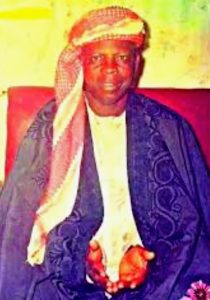

By Dada Ahmed.

When the late Alhaji Sule Adeku Onoko, fondly called Onikiri Marshall, stepped onto the stage, Egbiraland stood still. His voice, crisp yet deeply philosophical, was more than music,it was a cultural movement, a rhythm that carried the heartbeat of his people.
Regrettably,the days of this great musician of our time in Egbiraland have now passed into history.
Born on January 7, 1941, during the Egbira festival of Ekuechi, his very name Adeku,“male child born during Ekuechi”was destiny sealed in melody. It was as though he had been born with a drumbeat in his chest, a rhythm that would one day make him the soul of Egbira music.
According to oral history, Onikiri was the seventh of eight children of Pa Iganyi and Madam Eviyamoh Onoko. Young Sule was surrounded by music. His elder brother, Sadiku Onoko, helped shape his early passion. As a boy, he played the ichekenne, a humble percussion made from flamboyant seed pods. But Onikiri was no ordinary child,he fused it with ikede, the vigil music of his people, and created a new, distinct sound that was to define an era.
From weddings to funerals, naming ceremonies to festivals, his presence lit up gatherings. Audiences were enchanted by his simple yet profound lyrics, steeped in wisdom, humor, and Egbira philosophy. It was not long before his admirers crowned him:A composer’s composer,a conductor’s conductor and a singer’s singer.
Onikiri’s rise to stardom came during the Ibira Independence-era Unehe festival. His home in Otoyi in the present day Okengwe district of Okene Local Government Area of Kogi State,became a cultural Mecca, attracting pilgrims who wanted not just to hear him sing, but to bask in his presence.
For nearly five decades, he reigned as a cultural giant, his songs turning festivals into carnivals and quiet nights into philosophical journeys. At the Garage near Ohumanaka market, crowds once swelled so large during his shows that traffic stood still.
Every legend needs a worthy rival, and for Onikiri, it was Momoh Okasime, another Egbira music titan. But unlike bitter showdowns that mark other genres, their rivalry was marked by dignity and respect.
In 1978, when both refused to perform at the Garage festival, speculation was wild. But Onikiri, ever the philosopher, addressed it in song, reminding his fans that competition could exist without bitterness.
Behind the legend stood a formidable team. His band boasted loyal pillars like Adebayo Lawal (lead drummer), Suberu Onugogonyi, Mallam Momoh Yakubu, Alhaji Sheidu Lawal, Musa Suberu, and Michael Ohinoyi (Garido). Later, stars like Sumaila Maliki (Sanko) and Alhaji Umar Chatta (Livingstone) joined, enriching the Onikiri sound.
Even more inspiring was the community that rallied around him. Before every major performance, Onikiri would ceremonially break kola nuts at the home of Madam Ananwureyi, drawing blessings for the night. His brother Ozigi Onoko, alongside patrons and fans across Egbiraland, built a network of love around the singer.
In 2002, at the Unehe festival, fans showered him with U.S. dollars, a grand testament to the wealth of affection and respect he commanded.
Despite his fame, Onikiri remained humble, diplomatic, and fiercely Egbira at heart. His songs were clear, accessible, and deeply memorable,lyrics that carried messages about life, unity, respect, and cultural pride.
Family sources revealed that this highly respected entertainer of all time later battled diabetes for many years, but even the illness could not silence his However,in the early hours of July 19, 2011, Egbiraland and indeed, the entertainment industry lost a legend. But what he left behind was not silence,it was an eternal echo of his music.
His timeless album, “Irekuku” (Legacy), sums up his life’s work. Analysts in entertainment assert that it is not just a record,it is a cultural archive, a melody that binds generations of Egbira sons and daughters across the world.
Today, more than a decade after his passing, Onikiri’s songs still play at festivals, homes, and gatherings. They remind his people of who they are and where they come from.
Onikiri’s story is proof that true legends never fade. His beats may no longer echo from the Garage stage, but they live on in the hearts of Egbira people, etched into memory, culture, and song.
For the people of Egbiraland, Alhaji Sule Adeku Onoko is not just a singer. He was a melody that became a movement, a rhythm that became identity, a voice that will never die.


